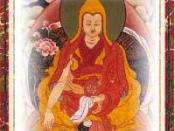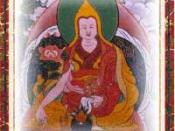China and Tibet The issue is about China and Tibet, Should or shouldn't Tibetan Exile Refugees change their peaceful approach toward China by appealing to sympathetic nations to militarily force China out of Tibet? During the 1600's Tibet was a very powerful country and the Dalai Lama was introduced as the leader or Tibet. China controlled Tibet in the Early 1700's. The British arrived in Tibet in 1904 to help them overcome China. They signed a treaty, and set up trading posts. China controlled Tibet until 1911, when Tibet kicked out Chinese troops. Even after 1911, China still claimed Tibet as an area within the Chinese domain. In the 1920's the Dalai Lama and the Panchen Lama fought over political affairs. Panchen Lama left Tibet and went to China with his court and stayed there until he died in 1937. A new Panchen Lama was introduced in 1944, But wasn't introduced to Tibet until 1949.
The Dalai Lama died in 1933. A boy was introduced as his successor, according to the customs of Tibet. The boy was a peasant, who was officially introduced as the Dalai Lama in 1940. Communists took over China in 1949. In 1950 China entered Tibet. In 1951 Tibet signed a treaty with China saying that they surrender to the Chinese government, but still had the rights to regional self-government. In 1956 the Preparatory Committee for the Tibetan Autonomous region was made with the Dalai Lama as chairman, and the Panchen Lama and a Chinese general were the vice-chairman. The Committee was made to establish Tibet as an autonomous region. Also in 1956, China's control in Tibet became stricter. In 1959 the Dalai Lama fled to India. Than the Preparatory Committee was led by the Panchen Lama. Tibet Became an autonomous region in 1965. At the time the Chinese government took over radio stations, newspapers, banks, and food shops. Tibetans were discriminated by Chinese soldiers and settlers. The Chinese government loosened their restrictions in the 1980's. Some religious shrines and monasteries were reopened, the farmers were allowed to grow whatever kind of crop they wanted, and however they wanted to sell them. In Lhasa in the 1980's Tibetan's again rioted against Chinese rule, China then sent more troops to Tibet. The Panchen Lama had supported many of China's Policies in Tibet and favored unity with China. Then in 1989 the Panchen Lama had died. While the Dalai Lama lived in India, he worked to stop China's control of Tibet through nonviolent ways. In 1995 the Dalai Lama announced the new Panchen Lama. The Chinese government refused to accept the Dalai Lama's selection, the Dalai Lama was welcomed at the White House on 11-10-98 where he met the President, the vice president, and the first lady to discuss Tibet. President Clinton expressed his strong support for efforts to aid a dialogue between the Chinese government and the Dalai Lama and his Representatives to resolve differences. The president welcomed the Dalai Lama's commitment to nonviolence and his efforts to initiate a dialogue with the Chinese government. The President and the Dalai Lama agreed on the importance of strong U.S.-China relations.
Tibet shouldn't go into war with China. They shouldn't even ask for military assistance from another country. Here are some reasons why. China's population is much larger than Tibet's population. So China's military would be much larger and stronger. China has a population of 1,246,871,951 and Tibet's population is about 6 million. China also has Chinese people living in Tibet, but Tibet doesn't have any Tibetans living in China. Its against Buddhist religion to go to war with China. One of the five precepts states "Do not harm any living thing". This means Tibetans can not go to war because they would be harming human beings. Even if Tibet got another country to help them fight china this will still be disobeying their religion. No foreign government would help Tibet, because they do not want to lose China as a business partner. Other countries are also afraid of China's nuclear power.
The people that would want Tibet to fight back would probably tell you that Tibetans are being taken advantage of by the Chinese because of their religion, they can not harm any living thing. So this is one reason why Tibet should fight back. Just because their very peaceful people it does not mean that China can go and kill everyone and take over their homeland. Their religion should come first, it should come before loosing their lives. For them to fight back they are taking a chance to give up everything they have.
To stay peaceful and make an agreement between two conflicting countries is the safer and better way. Going to war and fighting isn't smart at all, they can loose more than what they already have lost like their religion, the way of the 20th century is to talk it over and come to an agreement. Tibet should keep waiting and China could change their view after a certain period of time, and there is a chance that the communism would "die out", as did the Soviet Union. There is always a chance that China will leave Tibet alone. Tibet should not change their peaceful approach toward China by appealing to sympathetic nations to militarily force China out of Tibet.





